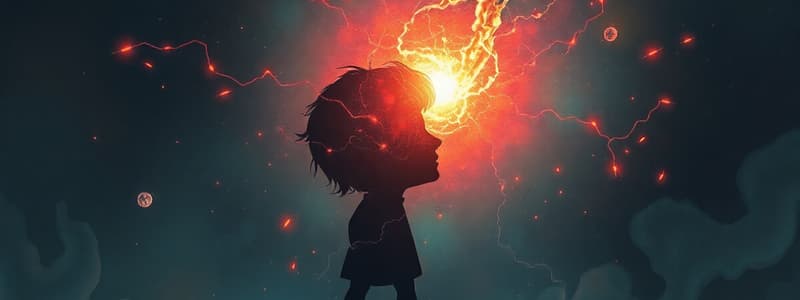Podcast
Questions and Answers
What primarily causes the loss of recent information stored in short-term memory?
What primarily causes the loss of recent information stored in short-term memory?
- Brain trauma (correct)
- Emotional stress
- Sleep deprivation
- Long-term memory interference
Which of the following statements best describes short-term memory?
Which of the following statements best describes short-term memory?
- It is susceptible to loss due to physical brain damage. (correct)
- It stores information indefinitely.
- It functions without needing any external stimuli.
- It is primarily affected by emotional experiences.
What happens to recently learned information in short-term memory following brain trauma?
What happens to recently learned information in short-term memory following brain trauma?
- It remains intact but inaccessible.
- It disappears. (correct)
- It is enhanced and recalled more easily.
- It is transferred to long-term memory.
Which of the following factors does NOT contribute to the disappearance of short-term memory?
Which of the following factors does NOT contribute to the disappearance of short-term memory?
What is the most common reason for information loss in short-term memory?
What is the most common reason for information loss in short-term memory?
What type of amnesia is characterized by the inability to recall events preceding a specific trauma while retaining memories formed afterward?
What type of amnesia is characterized by the inability to recall events preceding a specific trauma while retaining memories formed afterward?
What feature differentiates transient global amnesia from other forms of amnesia?
What feature differentiates transient global amnesia from other forms of amnesia?
A patient exhibits normal memory recall for events post-trauma but lacks memory for events prior. This is an indication of which condition?
A patient exhibits normal memory recall for events post-trauma but lacks memory for events prior. This is an indication of which condition?
Which condition would likely not exhibit the ability to recall new information after the event?
Which condition would likely not exhibit the ability to recall new information after the event?
In transient global amnesia, what is the typical duration of the memory loss experienced by the patient?
In transient global amnesia, what is the typical duration of the memory loss experienced by the patient?
What type of amnesia is primarily associated with difficulty in forming new memories in a patient with transient global amnesia?
What type of amnesia is primarily associated with difficulty in forming new memories in a patient with transient global amnesia?
Which statement accurately describes the memory loss in transient global amnesia?
Which statement accurately describes the memory loss in transient global amnesia?
How common is transient global amnesia compared to other forms of amnesia?
How common is transient global amnesia compared to other forms of amnesia?
In a case of transient global amnesia, what is the typical state of the person's past memories?
In a case of transient global amnesia, what is the typical state of the person's past memories?
Which of the following best characterizes transient global amnesia?
Which of the following best characterizes transient global amnesia?
What is a primary indicator of difficulty observed in the family member's daily life?
What is a primary indicator of difficulty observed in the family member's daily life?
How does the family member typically respond when faced with confusion?
How does the family member typically respond when faced with confusion?
Which statement best describes the family member's ability to recognize their family?
Which statement best describes the family member's ability to recognize their family?
What kind of financial management skills does the family member exhibit?
What kind of financial management skills does the family member exhibit?
In what aspect of social interactions does the family member demonstrate a challenge?
In what aspect of social interactions does the family member demonstrate a challenge?
What is the typical onset period for delirium?
What is the typical onset period for delirium?
Which disorder primarily affects recent memory formation?
Which disorder primarily affects recent memory formation?
Which cognitive disorder is often reversible?
Which cognitive disorder is often reversible?
Which statement correctly describes the course of dementia?
Which statement correctly describes the course of dementia?
What is the main characteristic of memory loss in delirium?
What is the main characteristic of memory loss in delirium?
In the Mini-Mental State Examination, what score range indicates severe cognitive impairment?
In the Mini-Mental State Examination, what score range indicates severe cognitive impairment?
Which of the following is NOT typically assessed in cognitive disorders?
Which of the following is NOT typically assessed in cognitive disorders?
What type of therapy can assist individuals with cognitive disorders?
What type of therapy can assist individuals with cognitive disorders?
What type of memory is primarily affected in Khalid after his head injury?
What type of memory is primarily affected in Khalid after his head injury?
What can be inferred about Khalid's long-term memory after the accident?
What can be inferred about Khalid's long-term memory after the accident?
How might Khalid's condition be classified in terms of memory types?
How might Khalid's condition be classified in terms of memory types?
After the car accident, which aspect of Khalid's memory is least likely to be affected?
After the car accident, which aspect of Khalid's memory is least likely to be affected?
What is a potential psychological impact of Khalid's difficulty remembering recent events?
What is a potential psychological impact of Khalid's difficulty remembering recent events?
Flashcards
Short-term memory
Short-term memory
The ability to recall recent events and information.
Short-term memory loss
Short-term memory loss
A loss of short-term memory usually caused by brain injury.
Brain trauma
Brain trauma
A trauma or injury to the brain, often caused by a blow to the head.
Brain damage
Brain damage
Signup and view all the flashcards
Cognitive decline
Cognitive decline
Signup and view all the flashcards
Post-traumatic Amnesia
Post-traumatic Amnesia
Signup and view all the flashcards
Transient Global Amnesia
Transient Global Amnesia
Signup and view all the flashcards
Anterograde Amnesia
Anterograde Amnesia
Signup and view all the flashcards
Retrograde Amnesia
Retrograde Amnesia
Signup and view all the flashcards
Anterograde Amnesia
Anterograde Amnesia
Signup and view all the flashcards
Severe Anterograde Amnesia
Severe Anterograde Amnesia
Signup and view all the flashcards
Milder Retrograde Amnesia
Milder Retrograde Amnesia
Signup and view all the flashcards
Executive Functioning Issues
Executive Functioning Issues
Signup and view all the flashcards
Agitation with Confusion
Agitation with Confusion
Signup and view all the flashcards
Name Retrieval Difficulty
Name Retrieval Difficulty
Signup and view all the flashcards
Delirium
Delirium
Signup and view all the flashcards
Dementia
Dementia
Signup and view all the flashcards
Amnestic Disorder
Amnestic Disorder
Signup and view all the flashcards
Mini-Mental State Examination (MMSE)
Mini-Mental State Examination (MMSE)
Signup and view all the flashcards
Amnestic Disorder (Memory Loss)
Amnestic Disorder (Memory Loss)
Signup and view all the flashcards
Impaired Attention (Delirium)
Impaired Attention (Delirium)
Signup and view all the flashcards
Attention Decline (Dementia)
Attention Decline (Dementia)
Signup and view all the flashcards
Physical Symptoms
Physical Symptoms
Signup and view all the flashcards
Study Notes
Cognitive Disorders
- Cognition is the brain's ability to process, retain, and use information, including reasoning, judgment, perception, attention, comprehension, and memory.
- A cognitive disorder is a disruption or impairment in higher-level brain functions. It has devastating effects on daily life, impacting a person's ability to function, potentially causing them to forget family members' names, perform daily tasks, or neglect personal hygiene.
- Causes of cognitive disorders can include hormonal imbalances in the womb, genetics, environmental factors, substance abuse, and physical injury.
- Symptoms of a cognitive disorder can include confusion (identity confusion), poor motor coordination, loss of short-term or long-term memory, impaired judgment, emotional imbalance, speech problems, motor problems, hyperactivity or hypoactivity, sleep disturbance, hallucinations, and perceptual disturbance
Cognitive Primary Categories
- Delirium
- Dementia
- Amnestic disorders
Delirium
- Delirium is a syndrome characterized by a disturbance of consciousness and a change in cognition.
- It typically develops over a short period, sometimes within hours, and fluctuates throughout the day.
- Clients experiencing delirium often have difficulty concentrating, are easily distracted, and may exhibit sensory disturbances like hallucinations or illusions.
Risk Factors for Delirium
- Accidental or intentional poisoning
- Elderly clients
- Recent major surgery
- Head injury
- Infection
- Multiple drug therapy
Dementia
- Dementia is a mental disorder involving multiple cognitive deficits, memory impairment, and at least one of the following:
- Aphasia (language disturbance)
- Apraxia (impaired ability to carry out motor activities)
- Agnosia (failure to recognize or identify objects)
- Disturbance in executive functioning (e.g., planning, organizing, sequencing, abstracting)
- The onset and course of dementia are slow, progressive, and terminal.
- It typically takes 8 to 10 years from the onset of symptoms to death.
- Dementia leads to significant impairment in social and occupational functioning and long-term loss of the ability to think.
- Symptoms of dementia can include agitation, depression, tremors, balance problems, language difficulty, hallucinations, and anxiety.
Amnestic Disorders
- Amnestic disorders are a group of disorders involving loss of memories, loss of the ability to create new or learn new information.
- These disorders are caused by damage to the brain or disease.
- Symptoms of amnestic disorders typically include loss of memory, disorientation with time and space, a lack of insight into memory loss, and difficulty learning or recalling information.
Types of Amnesia
- Anterograde amnesia: The inability to form new memories after an injury or event.
- Retrograde amnesia: The inability to recall memories that existed before the injury or event (opposite of anterograde amnesia).
- Transient global amnesia: A temporary loss of all memory, with both anterograde and a milder form of retrograde amnesia
- Infantile amnesia: The inability to remember events from infancy. It's common to almost everyone, and remembering things from infancy is rare.
Differentiating Cognitive Disorders
- Delirium: sudden onset, fluctuating symptoms, often reversible.
- Dementia: gradual onset, progressive, and largely irreversible symptoms.
- Amnestic Disorder: memory loss, more selective or gradual in development, could be reversible depending on cause.
Assessment of Cognitive Disorders
- Assess changes in cognitive functions (onset and course)
- Assess changes in functional status (e.g., self-care, cooking, finances, hygiene)
- Check for physical symptoms (nausea, vomiting, vision, hearing, speech, gait, balance, sensation, and motor functions)
- Evaluate general appearance and presence of aphasia, apraxia.
- Assess psychiatric symptoms (mood changes, behavioral and personality changes).
- Inquire about current medications, surgery, or trauma.
- Use the Mini-Mental State Examination (MMSE): a tool to assess cognitive function. This test grades cognitive function from zero (severe impairment) to 30 (no impairment).
Treatment of Cognitive Disorders
- Exercise and physical activity
- Sleep hygiene
- Relaxation techniques
- Cognitive training
- Psychotherapy
- Psychosocial support
Case Studies
- Provided case studies illustrating different cognitive disorders and their specific characteristics. These case studies illustrate real-world examples.
Studying That Suits You
Use AI to generate personalized quizzes and flashcards to suit your learning preferences.




